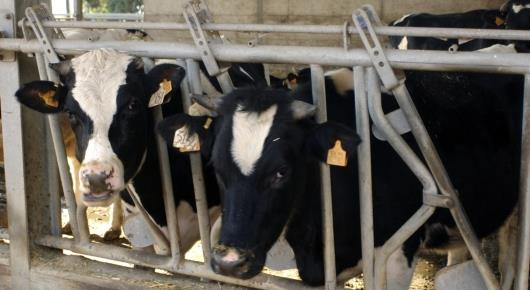Genetic quality of Moldova dairy cattle set to improve with FAO support

Improving livestock genetic resources in Moldova – with a special focus on dairy cattle – is the objective of an FAO project now in progress. As part of that initiative, a two-day workshop on artificial insemination gets under way here today.
The workshop brings together 50 technicians from the Artificial Insemination Center in Maximovca.
"Improving the genetic resources used in farming will lead to improved production of cattle and milk and will increase profitability for the farmers,” said Vice Minister of Agriculture and Food Industry Iurie Usurelu. “The final beneficiaries of the project will be farmers, including women farmers. They will be provided with extension services on dairy cattle husbandry to improve production, efficiency and profitability of their herds."
Training participants will learn about milk performance recording, best practices in breeding and artificial insemination as used in other countries. They will also be briefed on new milk control requirements being introduced by Moldovan authorities. The workshop’s second day will include practical training in the new techniques.
"Milk performance recording provides an opportunity for overall improvement in cattle husbandry,” said Tudor Robu, assistant FAO representative in Moldova. “Supporting performance-based selection of females within the herd for insemination improves long-term production and profitability.
“The training of technicians along with modern equipment for milk analysis and somatic cell counting,” Robu continued, “will enable the Artificial Insemination Centre in Maximovca to improve the breeding programme of its own pedigree dairy cattle and provide services for dairy farmers."
Since introduction of the market economy in early 1990s, cattle production in the Republic of Moldova has been largely the domain of household farms. Farmers had limited knowledge and capacity in cattle breeding and husbandry, and milk performance recording was even abolished. National capacity, technical expertise, and equipment for performance recording were all inadequate.
The FAO project "Development of the National Strategy and Action Plan for animal genetic resources and dairy cattle genetic improvement programme" commenced in 2015, as a contribution to development of the National Strategy and Action Plan for Animal Genetic Resources. It aims to reintroduce a performance-recording system in the dairy cattle sector through technical assistance and provision of laboratory equipment and reagents.
Direct recipients of the assistance are the national animal breeding authorities of the Ministry of Agriculture and Food Industry of Moldova as well as the national research institutes in this area.
21 February 2017, Chisinau, Republic of Moldova
